Please find our most recent market review below. We hope these perspectives are valuable to you.
– The AdvicePeriod Team
Markets Roar Ahead
Economic data continues to support the “soft landing” scenario. Stocks continue to outpace bonds, with international stocks continuing to lag. Federal Reserve officials said it’s too early to declare victory but generally supported the idea that this rate cycle has likely peaked.
Key Observations
- The S&P 500 gained 5.34% in February and is up more than 30% over the past 12 months.
- Small-cap stocks rose 5.65% and mid-cap stocks gained 5.59% for the month.
- Bonds ended the month down 1.41%.
- International developed markets were up 1.8% and emerging markets gained 4.8%.
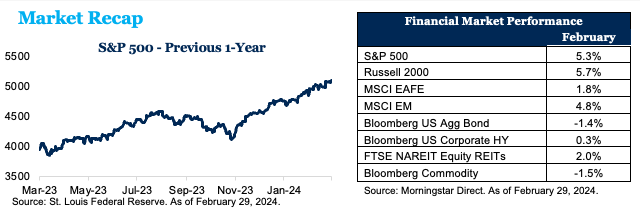
The stock market had another great month in February as the stock market responded positively to favorable economic data. The S&P 500 gained 5.34% and is now up 30.45% over the past 12 months. The Bloomberg U.S. Aggregate Bond Index was down 1.41% for the month, while the 10-year Treasury yield increased, starting the month at 3.86% and ending the month at 4.25%. Yields on the 2-year Treasury also increased in February, starting at 4.19% and rising to 4.53%. High-yield bond yields rose slightly. Small- and mid-cap stocks rose 5.65% and 5.59%, respectively. International developed markets ended the month up 1.83%.
The Economy Remains Resilient
Survey data showed that the U.S. services sector expanded faster than expected in January, the latest in a string of strong economic data releases that have some investors questioning whether inflation will keep cooling. Bond yields jumped in February after Federal Reserve Chair Jerome Powell suggested that central bank officials aren’t in a rush to lower interest rates. He also repeated his position that a cut in March wasn’t likely. The U.S. economy grew 3.1% over the past year, thanks to a resilient labor market that supported strong consumer spending.
Employers added a whopping 353,000 jobs in January, with most industries increasing employment, according to the Labor Department. That was the strongest gain in a year and easily double what economists surveyed by the Wall Street Journal were expecting. Bond yields surged after the report was released, a sign that investors believe the Fed will delay any cut in interest rates. December’s payroll gains were also revised upward to 333,000 from 216,000. The unemployment rate in January held steady at 3.7%. Wages outpaced expectations, jumping 4.5% from a year earlier.
Sales of previously owned homes rose in January from the prior month, rebounding modestly after sales last year dropped to their worst level in nearly three decades. The drop in mortgage rates of about a percentage point since last fall has encouraged some buyers to return to the market, even though home prices remain near record highs. Home sales increased 3.1% in January to a seasonally adjusted annual rate of 4 million, the highest level since August. January existing home sales, which make up most of the housing market, fell 1.7% from a year earlier.
U.S. retail sales fell 0.8% in January from December, according to the Commerce Department. Economists attributed the decline to cold weather and technical issues that might have impacted the report.
The Consumer Price Index rose 3.1% in January from a year earlier, according to the Labor Department. Core prices, which strip out volatile food and energy components, rose 3.9% on an annual basis. That was equal to December’s gain, which was the lowest since mid-2021. Meanwhile, the Fed’s preferred inflation gauge, the core Personal Consumption Expenditures Index, which strips out volatile food and energy prices, increased 3.1% from a year earlier, according to the Bureau of Economic Analysis. Core PCE advanced 2.8% from a year ago. The PCE report is a continuation of a trend that saw inflation decline at a much faster rate than the Fed and economists anticipated.
Low unemployment, solid job gains and easing inflation are consistent with a so-called soft landing, where inflation cools without triggering a recession.
Being Prepared for Market Declines
With the stock market up more than 30% over the past 12 months, many investors are celebrating the good news and anxious to experience further gains. But what if the stock market suddenly drops? The best time to think about market declines is before they happen. As we’ve often pointed out, market declines are unpredictable and can happen at any time for any reason. But just because you can’t predict market declines doesn’t mean you can’t prepare. Here are a few tips to be mentally (and financially) prepared for the next market decline:
- Market declines are normal, frequent and not a reason to sell quality investments.
- Market declines begin and end without warning.
- Market declines can provide an opportunity to buy quality investments at a lower price.
- Rebalancing is a better strategy than market timing.
- The best mental attitude during market declines is to stay focused on the factors you can control, such as the quality of the investments you own, your portfolio’s diversification and your own emotions by maintaining a long-term perspective.
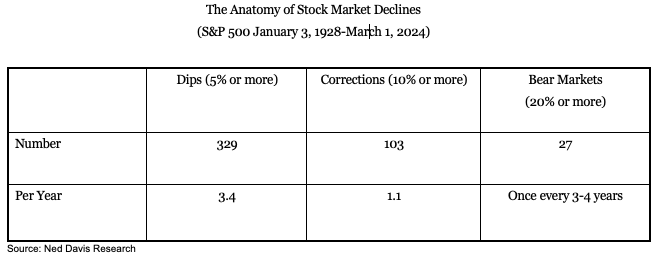
Disclosures:
This market commentary is meant for informational and educational purposes only and does not consider any individual personal considerations. As such, the information contained herein is not intended to be personal investment advice or recommendation. References to specific companies, asset classes, and financial markets are for illustrative purposes only. Rebalancing and diversification are investment strategies designed to help manage risk but they cannot ensure a profit or protect against loss in a declining market. Also, rebalancing may have tax consequences and transaction costs associated with it so please consult a financial professional before making any financial-related decisions.
The commentary represents an assessment of the market environment through February 2024. The views and opinions expressed may change based on the market or other conditions. The forward-looking statements are based on certain assumptions, but there can be no assurance that forward-looking statements will materialize. This commentary was written and provided by an unaffiliated third party; we cannot guarantee the accuracy or completeness of any statements or data contained herein.
Indexes are unmanaged and cannot be directly invested into. Past performance is no indication of future results. Investing involves risk and the potential to lose principal.
AdvicePeriod is another business name and brand utilized by both Mariner, LLC and Mariner Platform Solutions, LLC, each of which is an SEC registered investment adviser. Registration of an investment adviser does not imply a certain level of skill or training. Each firm is in compliance with the current notice filing requirements imposed upon SEC registered investment advisers by those states in which each firm maintains clients. Each firm may only transact business in those states in which it is notice filed or qualifies for an exemption or exclusion from notice filing requirements. Any subsequent, direct communication by an advisor with a prospective client shall be conducted by a representative that is either registered or qualifies for an exemption or exclusion from registration in the state where the prospective client resides. For additional information about Mariner, LLC or Mariner Platform Solutions, LLC, including fees and services, please contact us utilizing the contact information provided herein or refer to the Investment Adviser Public Disclosure website (www.adviserinfo.sec.gov). Please read the disclosure statement carefully before you invest or send money.
For additional information as to which entity your adviser is registered as an investment adviser representative, please refer to the Investment Adviser Public Disclosure website (www.adviserinfo.sec.gov) or the Form ADV 2B provided to you. Investment adviser representatives of Mariner, LLC dba Mariner Wealth Advisors and dba AdvicePeriod are generally employed by Mariner Wealth Advisors, LLC. Investment adviser representatives of Mariner Platform Solutions, LLC dba AdvicePeriod, are independent contractors.
Index Definitions: The S&P 500 is a capitalization-weighted index designed to measure the performance of the broad domestic economy through changes in the aggregate market value of 500 stocks representing all major industries. Russell 2000 consists of the 2,000 smallest U.S. companies in the Russell 3000 index. MSCI EAFE is an equity index which captures large and mid-cap representation across Developed Markets countries around the world, excluding the U.S. and Canada. The index covers approximately 85% of the free float-adjusted market capitalization in each country. MSCI Emerging Markets captures large and mid-cap representation across Emerging Markets countries. The index covers approximately 85% of the free-float adjusted market capitalization in each country. Bloomberg U.S. Aggregate Index covers the U.S. investment grade fixed rate bond market, with index components for government and corporate securities, mortgage pass-through securities, and asset-backed securities. Bloomberg U.S. Corporate High Yield Index covers the universe of fixed rate, non-investment grade debt. Eurobonds and debt issues from countries designated as emerging markets (sovereign rating of Baa1/BBB+/BBB+ and below using the middle of Moody’s, S&P, and Fitch) are excluded, but Canadian and global bonds (SEC registered) of issuers in non-EMG countries are included. FTSE NAREIT Equity REITs Index contains all Equity REITs not designed as Timber REITs or Infrastructure REITs. Bloomberg Commodity Index is calculated on an excess return basis and reflects commodity futures price movements. The index rebalances annually weighted 2/3 by trading volume, and 1/3 by world production and weight-caps are applied at the commodity, sector, and group level for diversification.
Does past performance matter?
Major Market Index Returns
Period Ending 3/1/2024
Multi-year returns are annualized.
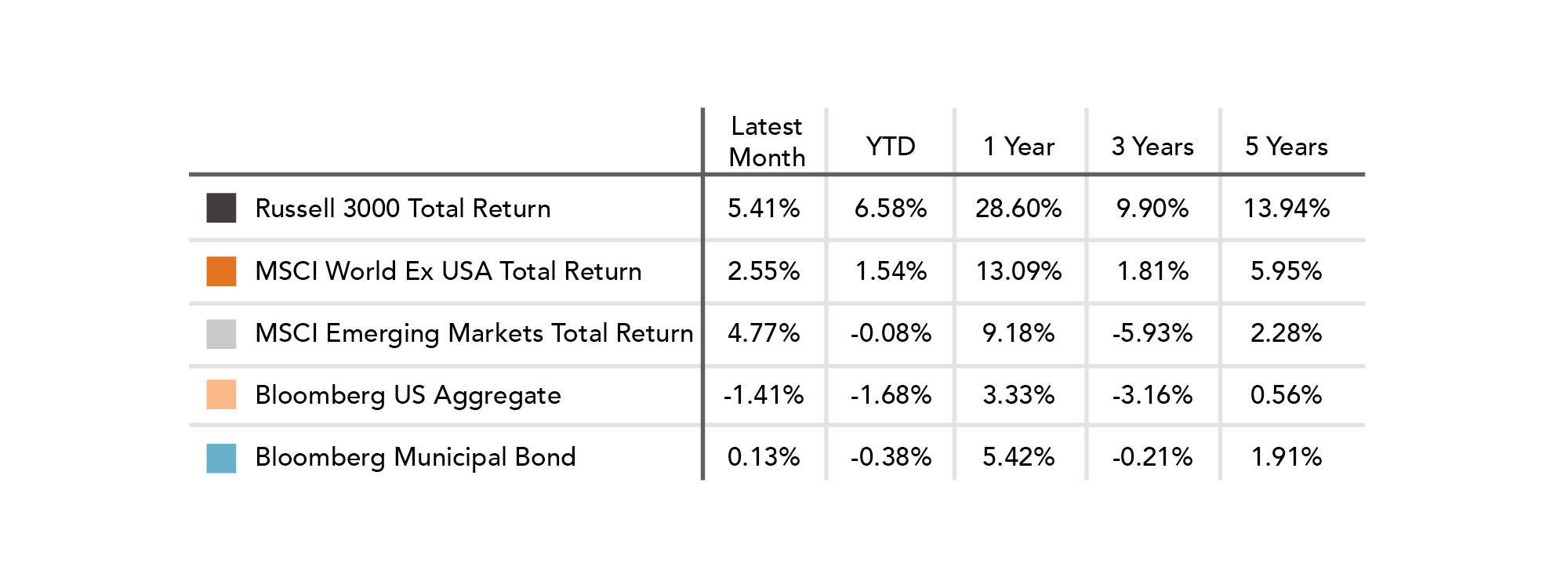
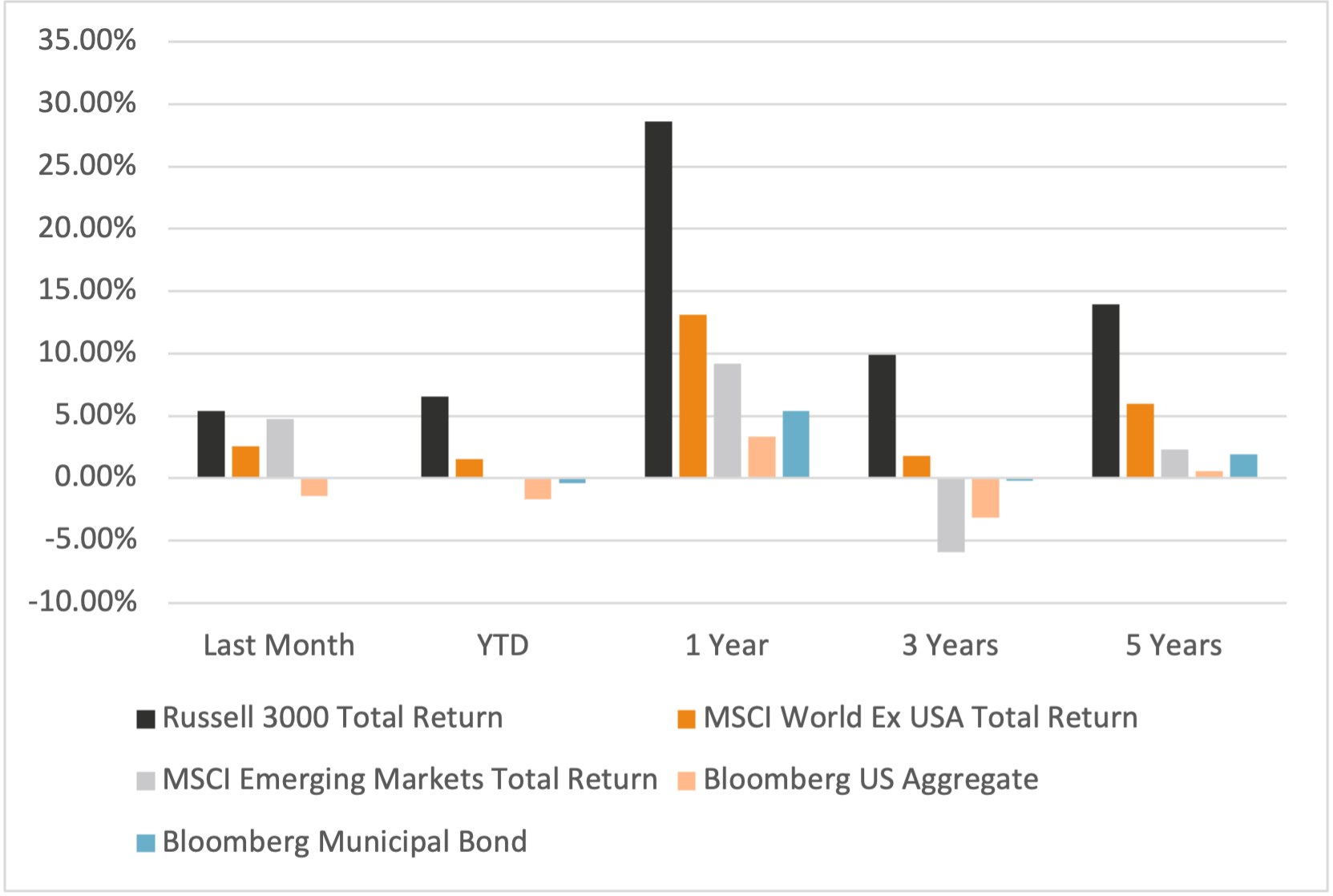
Mix Index Returns
Global Equity / US Taxable Bonds
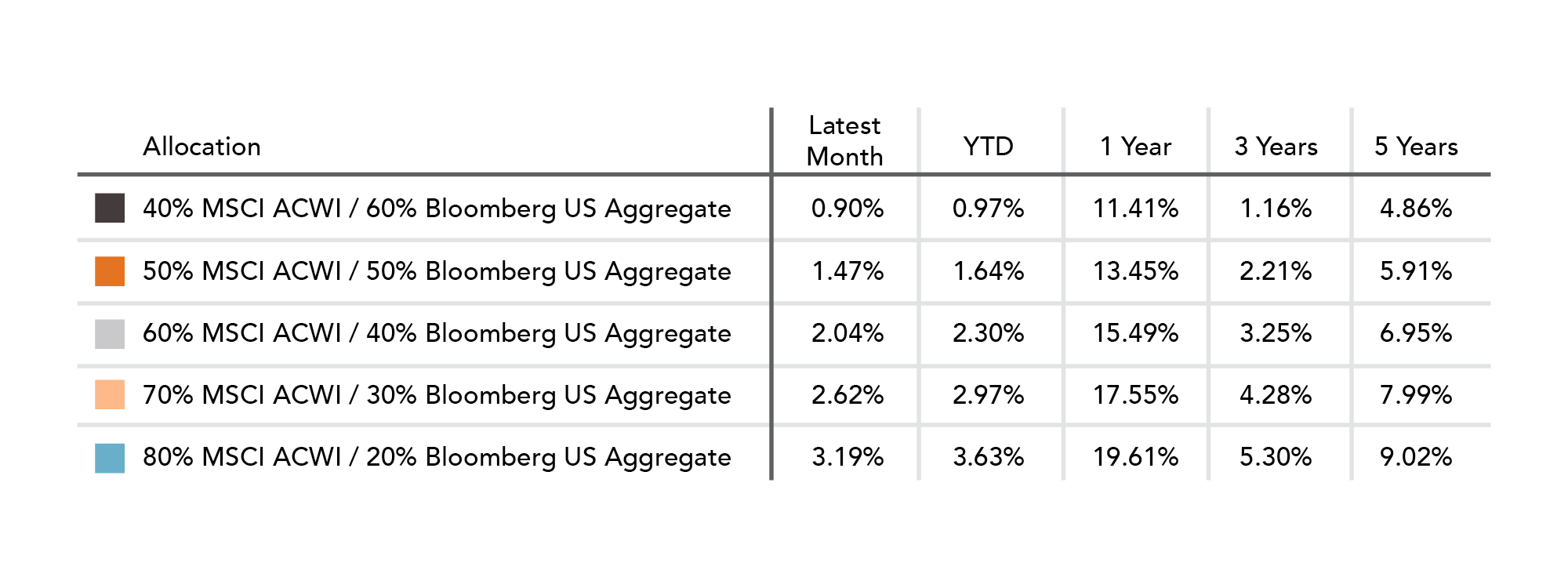
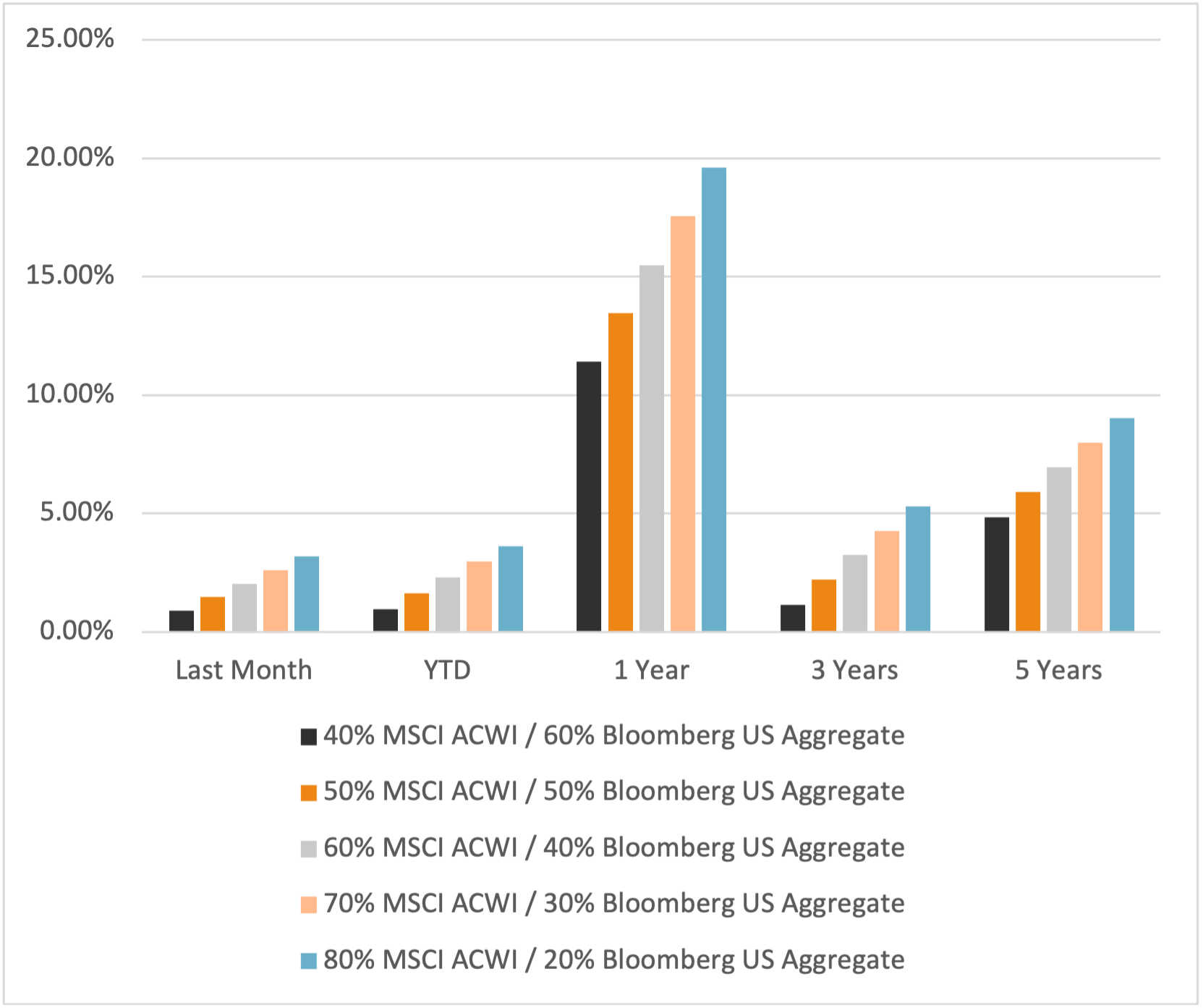
Indexes are unmanaged and cannot be directly invested into. Past performance is no indication of future results. Investing involves risk and the potential to lose principal.
The Russell 3000 Index is a United States market index that tracks the 3000 largest companies. MSCI Emerging Markets Index is a broad market cap-weighted Index showing the performance of equities across 23 emerging market countries defined as emerging markets by MSCI. MSCI ACWI ex-U.S. Index is a free-float adjusted market capitalization-weighted index that is designed to measure the equity market performance of developed and emerging markets excluding companies based in the United States. Bloomberg U.S. Aggregate Bond Index represents the investment-grade, U.S. dollar-denominated, fixed-rate taxable bond market, including Treasuries, government-related and corporate securities, as well as mortgage and asset-backed securities. Bloomberg Municipal Index is the US Municipal Index that covers the US dollar-denominated long-term tax-exempt bond market. The index has four main sectors: state and local general obligation bonds, revenue bonds, insured bonds, and prerefunded bonds.




April 2024 Market Commentary